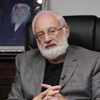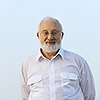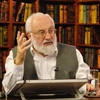Audio Version Of The Blog – 10/4/22
Listen to an Audio Version of the Blog
Download:MP3 Audio

Listen to an Audio Version of the Blog
Download:MP3 Audio
 The departure from this world of a great sage, teacher, and spiritual mentor is a special day. After all, he rises another degree higher and shows us that we should follow him.
The departure from this world of a great sage, teacher, and spiritual mentor is a special day. After all, he rises another degree higher and shows us that we should follow him.
We see that each of the great Kabbalists has taken a step forward in his own special way and brought the science of Kabbalah, the revelation of the Creator, the methodology, understanding, feeling, merging with the Creator and unity closer to people.
I think Rabash took the last step after everyone. He stands on the shoulders of all Kabbalists who lived before him, from Rabbi Akiva onwards, to Ari, Ramhal, and Baal Shem Tov. Rabash summed up everything they discovered for humanity, and he gave us this methodology in a ready, sorted form, which we can use and implement.
We need to hold on to the instructions for spiritual work he left as stated in his articles. Rabash did not want to go beyond the inner work of man in his explanations. He does not engage in philosophical or historical clarification and does not discuss the general development of mankind. He was very wary of presenting himself as a great Kabbalist, like Baal HaSulam, Ari, and Ramhal, and he tried modestly to keep a low profile. And so it went on throughout his life.
We have yet to reveal the essence of his contribution and his true height, and to see who our teacher really was.
[303470]
From the Daily Kabbalah Lesson 9/30/22, “Rabash Memorial Day (Yahrzeit)”
Related Material:
A Messenger Of The Creator
Who Is Rabash?
In Memory Of Rabash
 From My Facebook Page Michael Laitman 10/4/22
From My Facebook Page Michael Laitman 10/4/22
The Day of Atonement is a time for reflection. On this day, it is customary for Jews to reflect not only on their personal sins, primarily against each other, but for the entire Jewish nation to reflect on what it did not do, or should have done better as a nation toward the rest of the world. Most people who write posts about this day focus on the personal; I would like to focus on the forgiveness we should ask as a nation.
The Day of Atonement is a great opportunity to remind ourselves that we are unlike any other nation. We are the only nation that has the mission to be an example of unity, to cultivate love of others, solidarity, and mutual responsibility, and in this way become an example for the world.
To see that we do not forget our obligation to the world, the closing prayer on the Day of Atonement includes the entire Book of Jonah, who was a Jewish prophet who tried to avoid his obligation to save the gentile city of Nineveh. The story reminds us that we cannot escape our calling, that we will be found even deep inside a merchant ship whose sailors do not know our identity.
The very reason we should foster unity is to be an example, and not for our own sake. Accordingly, the prayers on the Day of Atonement are structured so that after we have asked forgiveness for our mistreatment of each other and reinforced our unity, the final part of the closing prayer reminds us of the purpose of all our efforts: to be a light to the nations, a nation that displays exemplary unity.
The Creator that our sages talk about is not a celestial entity of some sort; it is a force of bestowal, a desire to give. The Israeli people are those who strive to acquire this quality, the desire to give. This is why the people of Israel cherish charity, caring for others, solidarity, and all those other customs and traits that bind people’s hearts together.
Therefore, being “a light to the nations” means showing the nations of the world how they, too, can unite among themselves and with each other. However, the only way for Israel to help the world unite is by example. Israel cannot teach the nations; they do not need our instruction. All they need is to see our unity, and they will know what to do.
Because we are divided, we set the opposite example of what we must give to the world. This is why the nations hate us and blame us for their conflicts. Without our example, they, too, will not be able to unite, and they will blame us for their conflicts. If we unite, we will see how all the nations welcome us and gladly follow our example.
May this Day of Atonement be the last one in which we are divided and set a bad example to the world. May we be able to reflect on our actions on the next Day of Atonement and say, “We have united; we have become a light to the nations.”

Photo Caption:
Jewish worshippers take part in Slichot, a prayer in which Jews offer repentance and ask God to forgive their sins, ahead of Yom Kippur, the Jewish day of atonement and the holiest day in the Jewish calendar at the Western Wall in Jerusalem’s Old City in Jerusalem’s Old City, October 3, 2022. REUTERS/Ronen Zvulun
 From My Facebook Page Michael Laitman 10/4/22
From My Facebook Page Michael Laitman 10/4/22
The start of a new year (according to the Hebrew calendar) is a good time to reflect on the things that decide the quality of our lives. Economy is certainly one of the key factors that determine whether we live well or not.
Someone once said to me, “Money isn’t the most important thing in life, but it’s reasonably close to oxygen on the ‘gotta have it’ scale.” With that in mind, we should look at what is happening today. First, inflation is soaring, and this is bad news for all of us. Worse yet, we do not know why it is soaring. The war in Ukraine no longer justifies it, there is no pandemic in sight that shuts down the global economy, no shortage of oil, and no other apparent reason for the skyrocketing prices.
There are countless other problems and changes in the global economy. The job market is changing and fewer people are willing to work office jobs and prefer to work from home. There is a wave of resignations. Employers that were used to selecting from numerous applicants, sometimes have to pay for people to come only to be interviewed.
Another shift is accelerating automation. The shrinking number of people willing to work, especially in low-paying jobs, is injecting fuel into the robotics industry and more and more stages of production are now given to robots.
At the same time, people are not getting happier because they have more free time. Even though they have enough money to sustain themselves, their behavior is unbalanced, with exaggerated consumerism, prevalent substance abuse, violence, depression, narcissism, and countless other problems that together turn everything we do against ourselves.
Therefore, I believe that the root cause for the rising prices, and for the countless other problems I just mentioned, has to do with our relationships with one another. The economy reflects the state of society, and not the other way around. The economy does not cause social crises. Rather, when there is a social crisis, it is likely to disrupt the economy.
The problem is that the more we develop, the more self-centered we become. If you look at all of nature, you will find that the more it develops, the more cooperative it becomes—the exact opposite of humanity.
For example, more developed animals on the food chain have more complicated organisms. These animals then form a complex system where the survival and health of each species depends on the survival and health of every other species.
Our universe is another good example. It evolved from separate particles of hydrogen and helium that condensed into vast and complicated systems of galaxies, stars, and planetary systems, with channels that connect them and transfer matter throughout the universe.
Human society has also evolved impressively over the centuries and has become a global mesh where each part contributes its unique skills to the benefit of humanity. Why then are we not thriving? Because we hate the idea that we are connected; we are utterly self-centered, and the very idea that we are dependent on someone else makes us cringe.
To avoid being dependent, and to assert ourselves as the rulers, we fight against each other. It does not have to be a war between countries; we are fighting all the time: at work, at home with our partners and children, on the road, in the supermarket, and often even in our sleep. We are miserable.
The global economic downturn, therefore, reflects our social disarray. Because we are growing increasingly connected and increasingly self-centered simultaneously, the contradictory trajectories are tearing the fabric of human society. As a result, the economic structure we have built, which relies on mutual support and global supply chains, is breaking up.
The soaring inflation is only the beginning of our woes. Unless we adjust our relationships to match our level of connectedness, we will suffer from shortages that will lead to hunger and social disentanglement.
Our task, therefore, is not to change the economy, but to change the ill-relations we have with one another, which are sickening the global and local economy. The economy will be all well and good when the society is well, and the society will be well when we start seeking how we can help each other rather than hurt each other.

 All the nations of the world celebrate the New Year as an ordinary corporeal holiday, and only the Jews have a special celebration as we celebrate the creation of Adam. This is a very significant date.
All the nations of the world celebrate the New Year as an ordinary corporeal holiday, and only the Jews have a special celebration as we celebrate the creation of Adam. This is a very significant date.
Five days before the New Year (Rosh HaShanah), the creation of the world took place, and on New Year’s Day, at the fifth hour of Friday, Adam was created.
All the red dates of the Jewish calendar are dedicated not to the corporeal holidays, but to various spiritual actions, including the creation of the world and the creation of Adam. They gave our people a general and purposeful movement forward.
Adam is a soul, i.e., a structure of force, a network of forces, which is supposedly located somewhere in space and is an analogy of the Creator.
But it was created from above, under the influence of the upper force, which is kindness, love, and bestowal. Therefore, the structure itself was in the same state of bestowal, love, and mercy toward itself, and was an internal, self-sufficient “cocoon” that did not need to develop, it existed by itself.
In order to force this structure to develop, it was necessary to shake it somehow, to introduce an element of interference into it, a sharp external influence. This was done with the help of an additional system called Hava or Eve. She disturbed Adam’s inner balance, and as a result, this structure exploded from the inside.
For example, when an imbalance occurs in an atomic bomb due to excessive convergence of the two halves, the critical mass increases and self-decay begins, which leads to a nuclear explosion.
The same thing happened here. It turns out that we basically celebrate the fall. It would seem that we should sit in mourning, fast, cry, and “sprinkle ashes on our heads.”
No, we celebrate it, because thanks to the shattering we can assemble ourselves from the fragments of Adam and Eve and bring ourselves to the state similar to the upper force that created them and become equal to it in perfection and eternity.
In this way, we correct what the Creator deliberately broke for us, just as parents disassemble a puzzle for a child so that he becomes smarter by assembling it. In all this action, we must see the preparation of the Creator who treats us with love and wishes that we reach His perfection, become equal to Him.
Therefore, we celebrate the opportunity given to us for correction as a holiday. This is the New Year.
[166344]
From KabTV’s “Holidays, Rosh HaShanah“
Related Material:
Judging Yourself
5775 Years Ago
A Happy Union With Nature’s Holiday
My new article on Linkedin “When Nature Speaks, We Should Listen”

Hurricane Ian left a trail of devastation that will take weeks to assess, years to repair, and who knows what new adversities will happen in the meantime. According to scientists, climate change likely did not cause Ian, but it did intensify it. Unless we implement far more fundamental instruments of correction, we had better prepare for much worse, since when nature speaks, we should listen.
The ferocity of storms is growing, wildfires are becoming more frequent and intense, and droughts are vanquishing rivers and lakes. The more we interfere with nature and disrupt it through wanton exploitation, the more we trigger aggressive and extreme phenomena.
In the wisdom of Kabbalah, “nature” is synonymous with “God.” This does not mean that we should bow down to the wind or the sun like the pagans did, but that we must understand that we are dealing with superior forces here, far stronger than we can ever be. Therefore, we should follow their directives rather than try to dominate them as if we were superior to them.
Their directive is simple: Stay balanced. Nature is telling us that we cannot take for ourselves more than we need because we create deficits that nature takes back with a vengeance. The more we take beyond our needs, the more intense is nature’s revenge. This is why natural disasters are growing more intense.
We should not deny ourselves of anything we need. However, we have become accustomed to getting not what we need, but what we want, and there is a big difference between what we need and what we want.
I believe that America as a country, and the American people, are resilient enough to come through the adversity and make the necessary changes. Florida will recover from the aftermath of Ian, but what happens beyond repairing the physical damage depends on the entire country.
America, the world champion in consumerism, should reroute and lead the world toward a new paradigm: more balanced and sustainable. The focus in the 21st century should shift from improving material life to improving social life. Our material needs have been met; now it is time to meet our emotional needs, and these will be met when we create a society where people enjoy living.
The only way to create an enjoyable society is to foster good connections among people. Consequently, if America can focus on mending the growing alienation among people, it will give people a sense of contentment. This, in turn, will reduce people’s focus on materialism, which will effortlessly curb excessive consumption. People will not feel dissatisfied since their satisfaction will come from social connections rather than material possessions.
There is no limit to the amount of social bonding that people can form; it is the ultimate sustainable resource. If we tap into it, we will find an abundance of power and joy in social connections. Then, instead of exploiting nature to try to satisfy our insatiable wants, we will naturally take only what we need, and direct our positive energies toward each other.
[303719]

Michael Laitman, On The Times of Israel: “The Far Right Is Close to People’s Hearts”
Giorgia Meloni’s Brothers of Italy right wing party has won Italy’s general election, and left wing media in Europe and beyond are up in arms with worry. CNN described Meloni’s party as “the most far-right government since the fascist era of Benito Mussolini.” France 24 declared that “A ‘seismic’ shift” was happening in Europe. Vox announced, “The far right is having a moment in Europe. Actually, everywhere.” And the Wall Street Journal is concerned that “Right-Wing Populism May Rise in the U.S.”
There is certainly a shift in Europe. Besides Italy, Sweden also recently elected a Right leaning Riksdag (Swedish parliament), which will likely elect a right leaning prime minister. Bulgaria, too, just had its general election, and there, too, the Right seems to have won the majority.
Even where the Right has not won majority votes, it is gaining popularity. France, Spain, Poland, Austria, the Netherlands, and several other European Union countries are seeing rapid strengthening of the Right.
However, I think that what the left wing media, as well as some politicians, describe as “far right” or even leaning toward fascism, is neither “far” nor fascist. It is a natural outcome of people’s resentment to Russia, and a natural shift that is happening anyway. The weakening Russian influence in Europe will instigate more changes and shifts, as many arrangements that were put in place after World War II are disintegrating, so we can expect many more changes to happen. These shifts may well initiate renewed border debates, and conflicts that have been latent until now may resurface.
That said, the newly elected right wing leaders do not see themselves as fascists or extremists. Rather, they regard themselves as conservative and more inclined toward the nation-state than toward the pan-European idea. Either way, I do not see a Mussolini-type leader rising in Italy or in Europe; too many forces would impede such a development.
Europe is facing many challenges: social problems, unabsorbed immigration, economic challenges, shortage of gas, and many other challenges that should worry Europeans more than the political affiliation of this or that leader. By and large, Europe should stay united, but it should improve the unity they are already in and not break it apart. They should work together on their future, or they might find themselves on par with Third World countries.
To emerge from the crisis, Europe must establish real union, unlike the “union” that currently exists, with one or two domineering countries and the rest being forced to obey dictates. Real union means that people in different countries feel united despite the differences in language, culture, and sometimes even faith.
It should not be unity against an external element, such as against Russia’s military or against the American economy. It should be unity because unity itself is a noble value that makes life easy and safe for everyone. Borders, eventually, should be all but eliminated, and economies should be integrated.
Also, the US should become more involved in Europe, but not in an authoritarian manner, but more as an assistant in bringing Europe together. I realize that this is not an immediate scenario, but the direction is clear and the sooner Europe heads toward it, the better it is for the Europeans.
Another interesting point is that the newly elected leaders, and generally Right leaning people in both Europe and the US, maintain more favorable views toward Israel. I believe this is so because they see Israel as a partner in what they would like to do in Europe, namely consolidate the nation states rather than disintegrate them, which is where the Left seems to be headed in recent years.
This does not mean that the Right leaning parties strive to break up the EU, but only to cure it from the excessive power held in the hands of a few at the expense of the nation states. Ironically, it seems as though the Right is the one aspiring for equality these days, while the Left is headed more toward endowing a few dominant figures with the power to govern the rest of Europe. For these reasons, I think that the Right is not far, but actually nearer to people’s hearts, to people’s real sentiments, and presents a healthy process that Europe is experiencing.
[303672]

Michael Laitman, On The Times of Israel: “On the Possibility of Nukes”
Last Friday, Russian president Vladimir Putin announced the annexation of four regions in Ukraine. A day later, Ukrainian forces recaptured the key city of Lyman in the region of Donetsk, one of the annexed regions. In response, Ramzan Kadyrov, head of Russia’s region of Chechnya, said that Moscow should consider using a low-yield tactical nuclear weapon in its war against Ukraine, Reuters reported.
This was not the first, or second time that the idea of using nuclear weapons in Ukraine came up. Former Russian president Dmitry Medvedev, also warned that Russia might use nuclear weapons, but Kadyrov’s statement is the most explicit and presents an escalation in the level of aggression.
I am not surprised that the idea of a world war is on the table, or that it is expected to be a nuclear one. My teacher’s father, the great thinker and kabbalist Yehuda Ashlag (aka Baal HaSulam), wrote shortly after the end of World War II that humanity has learned nothing from the past, and that a third, and even fourth world war was possible, and that they will be atomic wars. Clearly, Baal HaSulam’s ideas were not accepted and people thought that humanity would not dare repeat the horrors of Hiroshima and Nagasaki. Just as clearly, people were wrong, and the possibility of nukes seems very real today.
However, I do not think that humanity has forgotten World War II altogether. Even if nukes are used, it will probably not be an all-out nuclear world war, but more along the lines of tactical weapons, and the horrific results of even these nukes will revive the trauma of the past. Hopefully, this will be enough to stop humanity one step before destruction.
Additionally, people are more aware today that the root cause of our woes is our division, the mutual hatred that infests people and nations. The notion that our survival depends on our unity, or at least on the level of our solidarity, is gaining ground throughout the world. This, too, at least somewhat inhibits people’s passion for blood.
In his writings, which he titled The Writings of the Last Generation, Baal HaSulam detailed why solidarity is the key to preventingV a third world war. Now that it is clear that democracy, international agreements, treaties, and sanctions are helpless before hatred, perhaps people will be more open to try the only antidote to mutual destruction: mutual construction, or in simpler words, solidarity and unity.
Everyone realizes that there will be no winners in an atomic war. I hope and believe we have enough sense to remember this before we pull the nuclear trigger.
[303563]
 Comment: You said that drama makes a person go through all the experiences himself, but comedy does not.
Comment: You said that drama makes a person go through all the experiences himself, but comedy does not.
My Response: But in comedy you can go through more states than in a drama. In a drama, you stand still, freeze, and kind of stop. In humor, on the contrary, you roll forward and can go through a great number of states. We think humor is light and drama is deep, but it depends on your point of view.
Why is everyone really afraid of comedians and satirists? Because humor can be very deep. This is the deepest digging of human nature or all kinds of social phenomena.
The humor I have in mind is very deep. It is a certain attitude to our flaws. But they can be opened in such a way that we simultaneously understand how they can be corrected.
Tragedies, however, suck you in. You become petrified, cemented in this very phenomenon, and in the experience when you sit and just devour yourself. This is silly.
I think humor is smarter than tragedy, not humor such as all sorts of stupid jokes, but real subtle serious humor designed for connoisseurs, for smart people. It is always kind.
These are not some tricks and hints, but very deep expressions of our secret, subconscious feelings and thoughts. In general, a very useful thing.
[303136]
From KabTV’s “I Got a Call. Comedy or Drama?” 5/22/13
Related Material:
When Kabbalists Laugh
Humor, Defense Against Worries
The Rapid Growth Of The Ego In Society
 Question: Why do we read The Book of Zohar?
Question: Why do we read The Book of Zohar?
Answer: We use it as means of spiritual advancement of the group.
First of all, the acquired desire manifests itself in the form of a certain group of people. Individual broken desires appear to each other in physical form and, because of this, are able to establish an initial connection between themselves. They gather in a group and study The Book of Zohar.
At the same time, the broken desire seems to strive for something above it. A joint study of a higher degree under the guidance of a teacher, given everyone’s correct participation, brings changes to the friends. They try to acquire the vessels of a straight line, then the surrounding light in the vessels of the circle around them is ready to enter them. But for now, it comes from the circles to the voids of their desires from afar, in the form of surrounding light, until they take a straight form.
This, in fact, is the purpose of studying. Then, in the corrected vessels, they will be able to study the same texts and the same lights that have turned from external to internal and have passed from vessels of circles to vessels of a straight line.
Thus, The Book of Zohar is a special tool we use without knowing exactly how it affects us. But it doesn’t matter, it still works.
Question: Why is The Zohar more powerful than The Torah in this sense?
Answer: The Book of Zohar has a stronger effect than the Torah because it is written in a style and form that is dictated by the period following the destruction of the Temple.
Previously, the people of Israel were at the height of Mochin de Haya, their personal end of correction, and then fell from it into concealment. As a result, Kabbalists are in a broken state among everyone and at the same time rise above all. This difference between the two “ends” of reality, between the world of infinity and our world, has opened up in them.
The sons of Israel fell to the bottom, into the heaviest egoism, while the Kabbalists of Rabbi Shimon’s group were at the top. As a result, the gap, the rift between them, the nation ran from negative infinity to positive infinity.
After that, throughout exile until its very end, the vessels of the people of Israel should mix with all the others and bring spiritual sparks into them.
The Torah is another matter. Moses wrote the Pentateuch at the height of final correction. He himself was above all, but the people were not in the same state. After all, they had just come out of Egypt, and Egypt is not yet a breakage.
In Egypt you only reveal your small degree rather than the entire breakage, in the course of which sanctity enters into defilement, “rattling” it and allowing for the correction of flaws, “expanding by leaps and bounds.” So, since the people had not yet reached such states, Moses could not reveal or express in the Pentateuch all the processes of correction. He reflected only what had happened up until then.
In general, each level includes all the others. The individual and the whole are equal. Therefore, the Torah of course, contains everything, but in such a form that it is impossible to use in its entirety for the correction of souls. You cannot extract light from the Pentateuch that returns broken souls to the source because the exodus from Egypt occurred before the present breakage.
In ancient Babylon, only a small part of it was revealed, which made it possible to unite the GAR, “forefathers ” to weigh their hearts down and, upon leaving Egypt, produce “sons” from them, the tribes of Israel. Then, followed the era of the two Temples and the last exile.
Thus, The Book of Zohar was written from completely different polar states with a maximum difference between the height of 125 degrees and the final breakage of the sons of Israel. Let’s not delve into the details or the spiritual circumstances of that era; what is important to know is that this book corresponds perfectly to what lies in nature.
[123513]
From the 4th part of the Daily Kabbalah Lesson 12/19/13, Writings of Baal HaSulam, “A Speech for the Completion of The Zohar“
Related Material:
Ascending Rungs Of The Ladder By The Light Of Zohar
Why Do We Read The Book Of Zohar?
The Magical Mechanism Of The Book Of Zohar